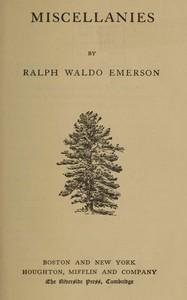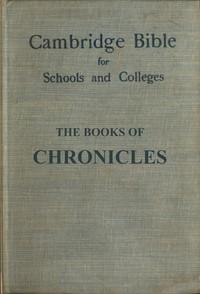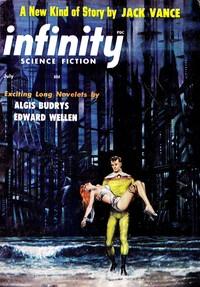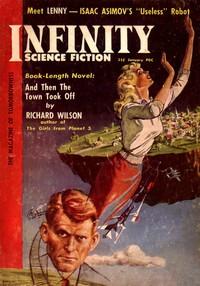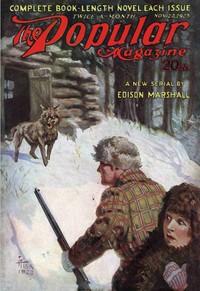|
|
Read this ebook for free! No credit card needed, absolutely nothing to pay.Words: 136754 in 29 pages
This is an ebook sharing website. You can read the uploaded ebooks for free here. No credit cards needed, nothing to pay. If you want to own a digital copy of the ebook, or want to read offline with your favorite ebook-reader, then you can choose to buy and download the ebook.

: Miscellanies by Emerson Ralph Waldo Emerson Edward Waldo Editor - Speeches addresses etc. American@FreeBooksWed 27 Mar, 2024 NOTES 545 THE LORD'S SUPPER SERMON DELIVERED BEFORE THE SECOND CHURCH IN BOSTON, SEPTEMBER 9, 1832 I like a church; I like a cowl, I love a prophet of the soul; And on my heart monastic aisles Fall like sweet strains, or pensive smiles: Yet not for all his faith can see Would I that cowl?d churchman be. Why should the vest on him allure, Which I could not on me endure? The word unto the prophet spoken Was writ on tables yet unbroken; The word by seers or sibyls told, In groves of oak, or fanes of gold, Still floats upon the morning wind, Still whispers to the willing mind. THE LORD'S SUPPER The Kingdom of God is not meat and drink; but righteousness, and peace, and joy in the Holy Ghost.--ROMANS xiv. 17. In the history of the Church no subject has been more fruitful of controversy than the Lord's Supper. There never has been any unanimity in the understanding of its nature, nor any uniformity in the mode of celebrating it. Without considering the frivolous questions which have been lately debated as to the posture in which men should partake of it; whether mixed or unmixed wine should be served; whether leavened or unleavened bread should be broken;--the questions have been settled differently in every church, who should be admitted to the feast, and how often it should be prepared. In the Catholic Church, infants were at one time permitted and then forbidden to partake; and since the ninth century the laity receive the bread only, the cup being reserved to the priesthood. So, as to the time of the solemnity. In the Fourth Lateran Council, it was decreed that any believer should communicate at least once in a year,--at Easter. Afterwards it was determined that this Sacrament should be received three times in the year,--at Easter, Whitsuntide and Christmas. But more important controversies have arisen respecting its nature. The famous question of the Real Presence was the main controversy between the Church of England and the Church of Rome. The doctrine of the Consubstantiation taught by Luther was denied by Calvin. In the Church of England, Archbishops Laud and Wake maintained that the elements were an Eucharist, or sacrifice of Thanksgiving to God; Cudworth and Warburton, that this was not a sacrifice, but a sacrificial feast; and Bishop Hoadley, that it was neither a sacrifice nor a feast after sacrifice, but a simple commemoration. And finally, it is now near two hundred years since the Society of Quakers denied the authority of the rite altogether, and gave good reasons for disusing it. I allude to these facts only to show that, so far from the Supper being a tradition in which men are fully agreed, there has always been the widest room for difference of opinion upon this particular. Having recently given particular attention to this subject, I was led to the conclusion that Jesus did not intend to establish an institution for perpetual observance when he ate the Passover with his disciples; and further, to the opinion that it is not expedient to celebrate it as we do. I shall now endeavor to state distinctly my reasons for these two opinions. An account of the Last Supper of Christ with his disciples is given by the four Evangelists, Matthew, Mark, Luke and John. In St. Matthew's Gospel are recorded the words of Jesus in giving bread and wine on that occasion to his disciples, but no expression occurs intimating that this feast was hereafter to be commemorated. In St. Mark the same words are recorded, and still with no intimation that the occasion was to be remembered. St. Luke , after relating the breaking of the bread, has these words: "This do in remembrance of me." In St. John, although other occurrences of the same evening are related, this whole transaction is passed over without notice. Now observe the facts. Two of the Evangelists, namely, Matthew and John, were of the twelve disciples, and were present on that occasion. Neither of them drops the slightest intimation of any intention on the part of Jesus to set up anything permanent. John especially, the beloved disciple, who has recorded with minuteness the conversation and the transactions of that memorable evening, has quite omitted such a notice. Neither does it appear to have come to the knowledge of Mark, who, though not an eye-witness, relates the other facts. This material fact, that the occasion was to be remembered, is found in Luke alone, who was not present. There is no reason, however, that we know, for rejecting the account of Luke. I doubt not, the expression was used by Jesus. I shall presently consider its meaning. I have only brought these accounts together, that you may judge whether it is likely that a solemn institution, to be continued to the end of time by all mankind, as they should come, nation after nation, within the influence of the Christian religion, would have been established in this slight manner--in a manner so slight, that the intention of commemorating it should not appear, from their narrative, to have caught the ear or dwelt in the mind of the only two among the twelve who wrote down what happened. Free books android app tbrJar TBR JAR Read Free books online gutenberg More posts by @FreeBooks
: The books of Chronicles by Elmslie W A L William Alexander Leslie Kirkpatrick A F Alexander Francis Editor - Bible. Chronicles Commentaries@FreeBooksWed 27 Mar, 2024

: The burning world by Budrys Algis Schoenherr John Illustrator - Science fiction; Political fiction@FreeBooksWed 27 Mar, 2024
|
Terms of Use Stock Market News! © gutenberg.org.in2025 All Rights reserved.

